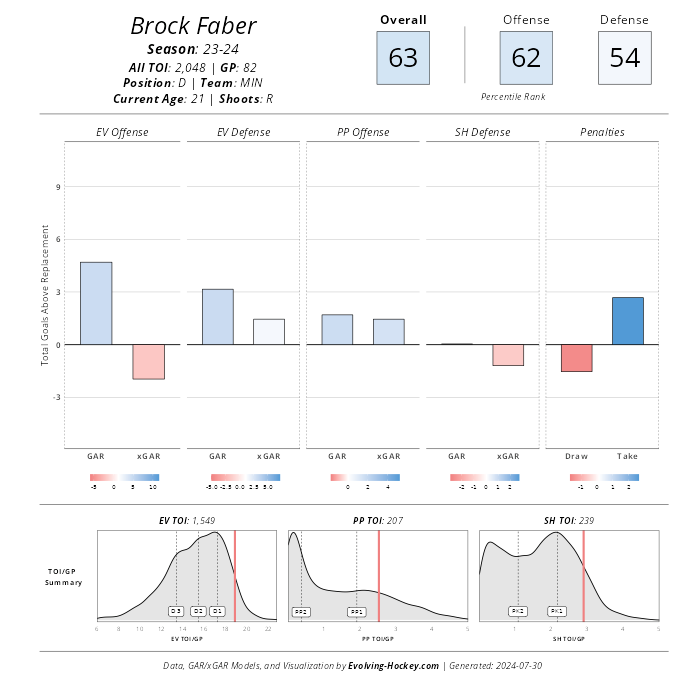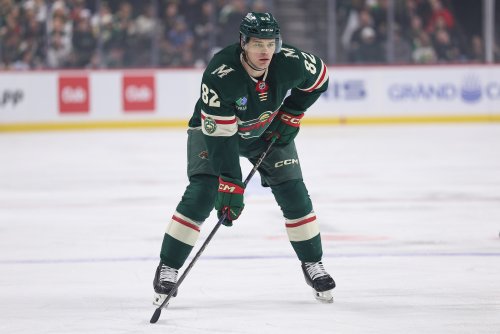
If you want to, you can compare Brock Faber's new eight-year, $68 million deal to several questionable extensions the Minnesota Wild have handed out in recent years. For one, they paid sticker price, and maybe even a touch more. Evolving-Hockey projected Faber at a $7.74 million cap hit for an eight-year deal, almost a million lower than the $8.5 million Minnesota landed on.
We also see some familiar timing traps that Bill Guerin's front office frequently falls into. They signed Faber at potentially the height of his value after finishing as the runner-up for the Calder Trophy, a major award. Minnesota didn't need to do this deal now. They could have waited a year and seen if Faber could repeat his rookie success.
Looking that over, the only real reaction I can make here is: Who cares?
You don't mess around with a franchise cornerstone, and we have good reason to believe that Faber is just that. Even with an injury that hampered his play-driving ability in the second half of the season, Faber still finished with 3.4 Standings Points Above Replacement, per Evolving-Hockey, which tied for 33rd among NHL defensemen.
Look at some of the names surrounding Faber in that category. Hello, Owen Power (3.5 SPAR), who signed a similar extension last season, which carries a $8.35 million cap hit. Hey, there, Filip Hronek (3.5 SPAR), Devon Toews (3.3 SPAR), and Dmitry Orlov (3.3 SPAR), who all make in the range of $7.25 to $7.75 million. It's not difficult to imagine that had he not broken his ribs, he'd have gotten to a level similar to, say, $9.5 million defenseman Charlie McAvoy (4.1 SPAR).
Can he do it again? That's a big question because there is some cause for concern with him. The combination of playing injured, and playing with Jake Middleton, who also fought through injury, made Faber's overall numbers look human at season's end. However, the biggest concern is that his offensive play-driving may not be where you'd like it to be for an $8.5 million defenseman. His on-ice shooting percentage made it look like he drove scoring chances to a much greater degree than the data shows, which was true even earlier in the year.

There's also the matter of points. They're secondary to a defenseman's overall game, but like it or not, the NHL's economy rewards and judges players based on points. Faber came out of nowhere to score 47 points as a rookie, only six fewer than he had in his three seasons at the University of Minnesota. He'll likely run the power play next season, which should drive another high-scoring year.
What happens after that? That's a question Minnesota might have to answer when Zeev Buium arrives. The Wild's top pick in the 2024 Draft is a natural power-play quarterback with exceptional vision and skating. You don't draft someone like Buium without envisioning handing him the reins to the power play. Even with second-unit time, Faber's points could slip without his play dipping.
I can note those potential red flags, and I can see that $8.5 million cap hit extending into the first year of the Zendaya Administration. Still, all I can say is: Who cares?
Faber's contract (probably) doesn't have the room for outright thievery that Matt Boldy's seven-year, $7 million AAV deal provides. As Buium takes over the prime scoring duties, the point totals might look a bit less like Drew Doughty and a little bit more like Jared Spurgeon. If that is the case, maybe the contract is considered an overpay.
But here's the thing: If you're going to overpay someone, don't overpay the Middletons and Freddy Gaudreaus of the world. Break the bank for someone like Faber instead.
Regardless of whether Faber winds up being a very good defenseman or a great defenseman, he will be someone who drives winning for the Wild. After seeing his first season plus playoff run, I feel extremely confident in pegging his absolute floor as a Jonas Brodin-level player. The same Brodin that's been a franchise cornerstone for 12 seasons in Minnesota.
If that's what Faber ends up as -- a big-minute, defensive defenseman -- we're only talking about a $2.5 million increase on Brodin's contract in a league where the cap is finally going up. And that's a worst-case scenario. To focus on the worst-case scenario is to talk about Faber like he doesn't have upside, which is unfair and untrue. Faber's rookie year carries some extremely encouraging comparables.
Since the Analytics Era started in 2007-08, 197 defensemen played 1,000 minutes in a season before turning 22. If we take those seasons and look at their SPAR per hour (to put everyone on an even footing), Faber's rookie year ranks 75th in that sample. What's his upside? Let's look at some players in that neighborhood.
Aaron Ekblad, 2015-16 (age 19): 0.104 SPAR/60
Jakob Chychrun, 2017-18 (age 19): 0.104 SPAR/60
Miro Heiskanen, 2018-19 (age 19): 0.104 SPAR/60
Seth Jones, 2015-16 (age 21): 0.104 SPAR/60
Jared Spurgeon, 2011-12 (age 21): 0.102 SPAR/60
Mikhail Sergachev, 2018-19 (age 20): 0.102 SPAR/60
Zach Werenski, 2016-17 (age 19): 0.102 SPAR/60
BROCK FABER, 2023-24 (age 21): 0.100 SPAR/60
Owen Power, 2022-23 (age 20): 0.099 SPAR/60
Oliver Ekman-Larsson, 2012-13 (age 21): 0.096 SPAR/60
We're looking at comparables who were all top-pairing defensemen at some point in their careers. Look at this list and tell me whose career path would be a disappointment for Faber to follow. Maybe Jones? Maybe Ekman-Larsson, since he fell off sooner than anyone would expect?
But if he's Heiskanen, Spurgeon, Ekblad, or Power (that is, what we think he can be), this contract is a home run, no? Even that next level down includes Chychrun, Sergachev, and Werenski. You'd have to take that and run with it.
While the Wild signed Faber a year before they had to, his leverage probably wasn't going down much, barring a complete collapse. He'll still have that runner-up status for the Calder Trophy in his corner. Besides, who's coming through the door behind him to usurp him as a top-pairing defenseman?
You can say Buium, but that's just for the top power play role. They play on different sides of the ice, so neither will take 5-on-5 time away from each other, whether they play on the same pairing or separately. There aren't any top-pairing right-shot defense prospects in the Wild's system. With all due respect to David Spacek and Jack Peart, the best versions of themselves should complement Faber, not displace him. Another Spurgeon isn't walking through that door, at least not in the foreseeable future.
Faber will be a top-pairing, two-way defenseman with the upside to be the best defensive defenseman in the NHL. His smart, efficient game will make him a staple in Minnesota, and Buium's impending arrival should save him from the pressure of having to do it all, which Faber had to deal with after Spurgeon's injury. If that's technically worth $7 million, and the Wild are actually paying $8.5 million... again, who cares?
It's great to get a steal on deals like Guerin got with Boldy and Joel Eriksson Ek. But if that's not in the cards, those are the kinds of players you can live with "overpaying." The best teams in the NHL spring for their cornerstones, even if it's at a premium, and worry about the rest later. Minnesota has had this idea backward at times, but perhaps this will indicate a turnaround of their philosophy going forward.
Think you could write a story like this? Hockey Wilderness wants you to develop your voice, find an audience, and we'll pay you to do it. Just fill out this form.
-
 5
5
-
 1
1






Recommended Comments
Join the conversation
You can post now and register later. If you have an account, sign in now to post with your account.
Note: Your post will require moderator approval before it will be visible.